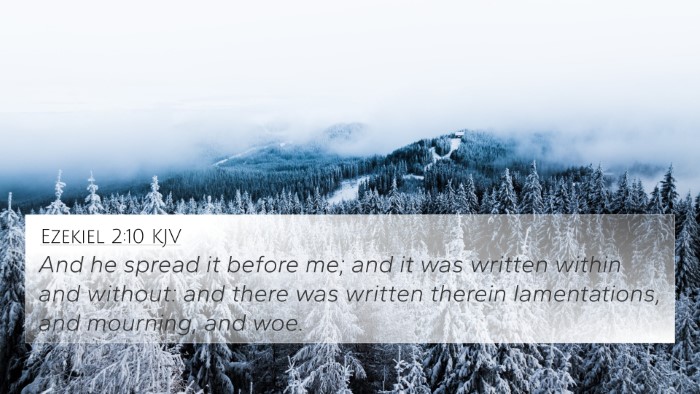Lamentations 2:5 - Verse Meaning and Insights
Lamentations 2:5 reads: "The Lord was as an enemy: he hath swallowed up Israel; he hath swallowed up all her palaces: he hath destroyed his strong holds; and hath increased in the daughter of Judah mourning and lamentation." This poignant verse encapsulates a profound expression of desolation and divine judgment.
Summary of Lamentations 2:5
This verse from Lamentations speaks to the calamity that befell Jerusalem, highlighting God's role in the devastation faced by His people. It expresses a shift in the relationship between God and Israel, portraying God as an adversary due to their transgressions.
Commentary Insights
Matthew Henry's Commentary
Matthew Henry observes that this verse signifies the serious repercussions of sin and rebellion against God. He notes that instead of defending them, the Lord has turned against Israel, serving as a reminder of God's holiness and the consequences of disobedience.
Albert Barnes' Notes
Barnes emphasizes that the verse indicates a complete devastation; it highlights the complete destruction of what was once strong and fortified. He explains how this reflects not just physical ruin, but emotional and spiritual mourning as well, indicating the depth of suffering among the Israelites.
Adam Clarke's Commentary
Clarke expounds on the idea that the Lord’s prior protection has turned into judgment. He mentions how the "daughter of Judah" signifies the inhabitants, and their mourning reflects their acknowledgment of God’s displeasure, showing a significant change in their emotional and spiritual state.
Thematic Connections
This verse can be profoundly understood within the thematic framework of God's justice, mercy, and the consequences of collective national sin.
Related Bible Cross-References
- Jeremiah 30:15: Discusses the cause of Judah’s pain and distress.
- Isaiah 63:10: Explores how Israel grieved the Holy Spirit, leading to divine abandonment.
- Psalms 44:9-16: Acknowledges feelings of abandonment by God amidst suffering.
- Lamentations 1:1: Contemplates the sorrow of the afflicted daughter of Jerusalem.
- Micah 3:4: Highlights how God will not answer prayers from those who do evil.
- Ezekiel 7:4: Foretells the judgment and loss of God’s favor.
- Deuteronomy 28:15: Discusses the consequences for disobedience to God’s commands.
- Hosea 13:9: Reveals how destruction comes from abandoning God.
- Psalm 78:59-60: Expresses God’s anger at His people’s disloyalty and subsequent abandonment of the sanctuary.
- Romans 1:18: Details God’s wrath revealed against unrighteousness.
Interpreting Lamentations 2:5
This verse serves as a reminder of the serious implications of turning away from God. It highlights the intimate relationship between sin and suffering, and the necessity for repentance. The emotional weight of mourning in the verse calls believers today to reflect on their lives and their standing before God.
Cross-Referencing Biblical Texts
The act of cross-referencing serves as a powerful tool for deeper scriptural understanding. By exploring related scriptures—like those mentioned above—readers can better grasp biblical themes, the interconnectedness of God's messages, and the impact of sin on both individual and communal levels.
Tools for Bible Cross-Referencing
Utilizing various tools such as a Bible concordance or a Bible cross-reference guide can greatly enhance your study. Understanding how to navigate these resources can provide invaluable insights into thematic Bible verse connections and enrich personal or group Bible study sessions.
Finding cross-references is essential for a thorough Bible study. It enables a unique exploration into the intricacies of God's word, encouraging deeper theological reflection and understanding of how individual verses, including Lamentations 2:5, relate to the broader narrative of scripture.
Conclusion
The lament expressed in Lamentations 2:5 is not merely historical but resonates through time, reminding us of the principles of divine judgment and mercy. In understanding this verse, alongside its connections, we can deepen our grasp of God's nature and our relationship with Him.
As you engage further with these themes, consider how each verse contributes to a larger understanding of God’s redemptive work throughout scripture. Whether for personal reflection or sermon preparation, exploring these connections can offer profound insights into the biblical narrative.











